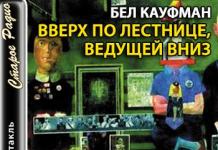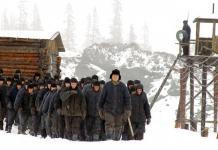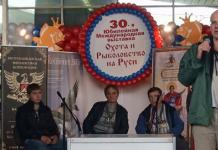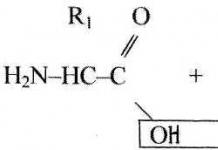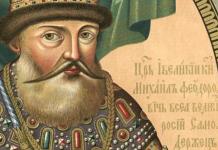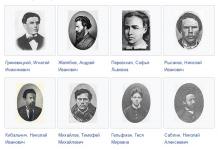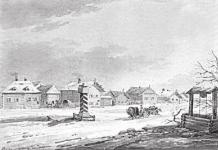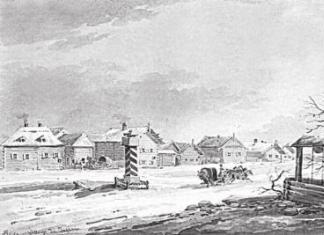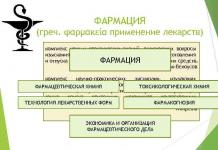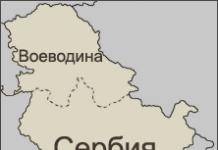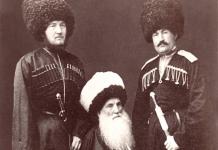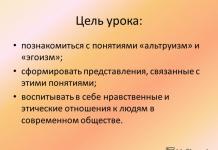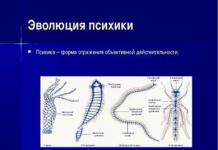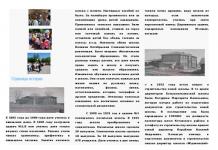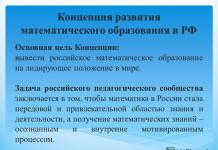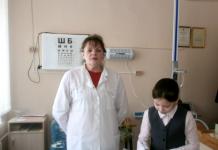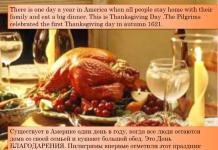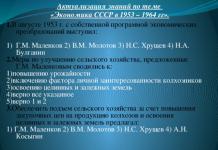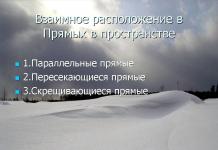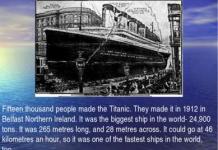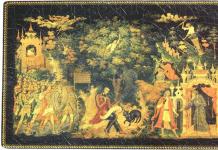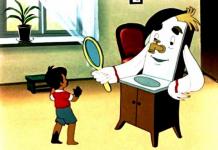On March 21, 2013, 34-year-old Valery Nikolaevich Falkov was elected rector of Tyumen State University, the oldest and in many respects the leading university in the Tyumen region. Falkov agreed to give the first major interview to Tyumen magazine, and not within the walls hometown, and in Skolko in Moscow, where he was at that time under the auspices of the Ministry of Education and Science of the Russian Federation.
The rector of Tyumen State University suggested that at first we just take a walk and inspect the building of the Moscow School of Management Skolkovo. Joking at the same time: “The scandals of the last year are not connected with her, but with the Skolkovo Foundation, which is not even located in this building.”
- What are you doing here? I clarified.
- Learning. The Ministry [of Education and Science of the Russian Federation] selected several people (at the level of rector and vice-rector) from universities in various regions and gathered here for special program where we are taught modern development management technologies educational institutions. Walk, so to speak, in step with the times. During the year, a variety of experts spoke to us, and literally tomorrow we are defending group projects - the results of our work during the year.
Valery Gut: What system of personnel training does society and the state need at the present stage of their development?
Valery Falkov: This is one of the key questions modern system higher education. The existing model of higher education was formed during the Soviet era. At that time, for those goals and objectives, it was certainly one of the best in the world. But that was in the second half of the 20th century, in a rigidly centralized state with a planned economy. The cardinal changes that have taken place over the past 25 years in the world and in Russia require profound transformations from higher education. In Soviet times, universities carried out a specific mission - providing personnel for sectors of the economy in accordance with the planned task. Today it is impossible to train personnel within the framework of such a system for many reasons. First of all, no one can predict how many and what kind of specialists the country will need in five to ten years. The world is changing rapidly, technology is developing at a revolutionary pace. During the time of study at the university, specialties appear that simply did not exist at the time of admission. This means that on initial stage it makes no sense to prepare students for narrow programs. All the same, many of them, even within the framework of one professional trajectory, will have to change several specialties in their lives. In this regard, the emergence of tiered education in Russia (bachelor's and master's programs) becomes understandable - this is a response to the challenges of the time, and not a whim of officials. In the 21st century, university graduates have slightly different requirements: they must be as adaptive as possible to changes, be able to quickly retrain and retrain other people, be able to work with large amounts of information, know at least one foreign language well and have the skills to work in interdisciplinary teams.
With this in mind, what indicator of the work of the university should be considered the main one? Employment of its graduates in the specialty?
Of course, it must be taken into account, but only with a certain degree of conventionality and in conjunction with other factors. Universities are often reproached for their inability to train personnel demanded by the labor market. At the same time, the demand, as a rule, is measured by the number of graduates working in their specialty. One cannot agree with this approach, if only because quite a few successful in professionally people are employed outside their specialty. But they took place and perfectly realized themselves in life! I agree with those experts who suggest that another indicator of the quality of a university's work is the amount of total taxes paid by its graduates during the first three or five years. However, it can hardly be the main and only criterion, since graduates of pedagogical institutes, by definition, will be inferior to their peers from oil and gas universities. And it's not about the quality of education - the level of average wages in these sectors of the economy varies significantly. At the same time, there are areas where the size of wages is not a determining condition for success. Much more important is the public recognition of a person (for example, politics or the activities of non-profit organizations). The difficulty lies in how to develop a mechanism for assessing the success of universities through this indicator. Thus, the quality of a university's work can be assessed through a system of interrelated data: the employment of graduates, including by specialty, the total amount of taxes paid by them over a certain period of time, and the level of their public recognition.
Reference
Falkov Valery Nikolaevich
Born on October 18, 1978 in the city of Tyumen. In 1995 he graduated with honors from the Novoseleznevskaya high school Kazansky district and entered the law faculty of Tyumen State University.
In 2000 he graduated with honors from the Institute of State and Law of Tyumen State University. In 2003 he defended his Ph.D. thesis ahead of schedule.
After defending his dissertation, he worked at the Tyumen State University as Deputy Head of the Department of Constitutional and Municipal Law, Deputy Director for academic work Institute of State and Law, Vice-Rector for additional education and branches, the first vice-rector, director of the Institute of Law, Economics and Management, acting rector of Tyumen State University. At the conference of the labor collective on March 21, 2013, he was elected rector of Tyumen State University.
Head of the Tyumen city branch of the Association of Lawyers of Russia. Member of the Tyumen City Duma, Chairman of the Commission on Urban Planning and Land Relations.
How do you assess the development of the Tyumen state university?
Despite all the difficulties of the post-Soviet period, the university has been steadily moving forward. In the most difficult periods, in the conditions of political and economic "turbulence", in my opinion, the right strategic decisions were made. However, time does not stand still, and today we (like most Russian universities, by the way) find ourselves in the crossroads of challenges: globalization, a reduction in the number of applicants, a transition to new production technologies, an essential renewal of the educational activities. In order to meet these challenges, it is necessary to determine the optimal development trajectory, taking into account national and local characteristics.
What university does our region need?
The Tyumen region has been developing very dynamically and comprehensively over the past 10 years. It occupies a leading position in Russia in terms of investment attractiveness, quality government controlled and the provision of public services, the volume of housing construction, the development of social infrastructure and many other indicators. Such a region needs a university that can not only promptly and adequately respond to the challenges of the time, but also be ahead of them. Ideally, it should become one of the drivers of economic growth. Tyumen State University has good story and great potential, but in order to fully meet the level of the region, we still have a lot to do. Our educational programs and topics scientific research needs to be better aligned with the needs regional economy and the labor market. The university should be included in all significant projects implemented in the region. In the long term, the region will not be able to compete with other territories without a progressive system of higher education.
Why are some universities successful and others not? What does it depend on? And what is your formula for success for Tyumen State University?
Home driving force University on the way to success are people - students, teachers and staff. We all see how the competition for human resources and intellect is getting tougher. The coming years will be decisive as the higher education system enters an era of dramatic change. Which university will take the lead and which will remain an outsider will depend not only on the desire of management teams and the will of the staff, on their focus on success, on transformation, but also on the ability to attract talent to the university, on a well-thought-out personnel policy. AT last years the work of our team is aimed at achieving the most important strategic goal - to become a national research university. And we are talking not so much about formal recognition by the state, but about an essential transformation. This goal for Tyumen State University has no other long-term alternatives.
If a university graduate becomes a university rector, he still retains a certain influence of the system in which he was formed, so he is unlikely to be able to significantly reform it. What do you think about this?
Can not be ideal options, everything has its pros and cons. So it is in this case. The graduate-rector is a product of the system, and it is often difficult for him to abandon the stereotypes that exist in the university, to “step over himself” in making urgent, but unpopular decisions in the team. For some time, the authority of his predecessors dominated him. "Varyag" is easier in this regard: he is not bound by obligations either with the team or with previous leaders. He can do everything from scratch. However, “his own” rector is a bearer of traditions, he is well aware of all the intricacies in the university, the history of relations between people working in it, and this helps in accepting right decisions. Ultimately, it all depends on the person. There are many examples in history when university graduates became their successful leaders or, conversely, did not live up to expectations. As well as rectors from outside.
What are your feelings on this post? What tasks did you set for yourself even before the election?
Changing the rector at a university is often very painful. There is no need to look far for examples, it is enough to refer to the experience of our colleagues from neighboring regions (for example, the Kurgan region). Therefore, my first task was to maintain the dynamic development of the university and social peace in the team. As for feelings, they are difficult to convey. By the time I was appointed, I had a very definite vision for five to seven years ahead: administrative work in the largest structural unit University (Institute of Law, Economics and Management), preparation and defense of a doctoral dissertation, implementation of a number of interesting educational projects ... What happened is like a snowball on the head. Well, there was no time to discuss further. It was important to at least save all the specified parameters. What is a university? A huge amount of routine work, daily decision-making, not even strategic, but tactical, but they still need to be taken, because if you don’t do this, then very serious problems can arise. The university has one feature - it accelerates for a very long time and slows down slowly. In other words, once you have gained momentum, it is difficult to quickly change course. You are already tearing off the stopcock, and it will still fly on steam for a year. You know, there is a big difference between acting and already rector. This is a completely different level of freedom in decision making. The responsibility is the same, the ideas may be the same, but when you are acting, you cannot do much. Your position is like on ice. And it's very easy to talk to you. Because you are on a slippery surface and you are trying not to take a single careless step. You are standing on the ice of a frozen lake, and everyone is watching whether you crash or not. (Laughs.) And some do not just look, but provoke you to all sorts of administrative pirouettes. As soon as you are elected rector, you move to a hard surface. That, in fact, is the whole difference.
Probably, the expectation of grandiose changes is associated with your arrival. Do you think your age at today's post is a plus or a minus for work?
More like a plus. Of course, I do not fit the classic image of the rector: gray-haired, over 50, wearing large horn-rimmed glasses. But on this score, I never had a complex and I don’t have a complex, what now, to live in someone’s formats? The state today has a very positive attitude towards young leaders and young people in general. And the Tyumen region is unique in this sense. If you look, we have a lot of young politicians and managers. So age, on the one hand, is not a guarantee of success, but on the other hand, it is not an obstacle to achieving significant results. Young people have advantages - a fresh look, a desire for change. Of the minuses - lack of experience and often characteristic of a young age, the desire to quickly make a decision, but I try to consult with knowledgeable people, do not rush and measure every step. As long as I'm not in a hurry. The university is a very conservative structure. Here one should “hurry slowly”, find a golden mean. You can’t improve everything at once, you need to choose the right priorities.
Ted Turner, founder of CNN, said this: "My father told me: always set your goal so high that it cannot be achieved in one lifetime, and thus there will always be something ahead." Do you have some global task that you, having taken the position of rector, would like to put so far ahead that, perhaps, even your energy, no matter how long you have been in this post, would not be enough to solve it?
All universities in Russia can be divided into three categories. The first is 14 selected by the state, who are tasked with becoming one of the 100 top universities of the world - they have already been nicknamed "cosmonauts". We do not treat them. The second category includes about 350-450 universities, among which there is a tough competition. Here in this category we must take a leading position. The third category, about 20% of the total, is "ballast" - educational institutions that issue diplomas without the proper quality of education. They will be closed in the coming years.
In your opinion, what place is Tyumen State University today?
There is no universally recognized ranking of universities to answer this question with confidence. All universities are divided into technical, classical, medical, agricultural, federal, national research. But in general, I know that today there is a group of universities that, according to any ratings, are among the top 25 in Russia. I think we're getting close to that, but we haven't made the list yet. And I would like our university to become one of the leading universities in Russia not by ratings, but by its essence and quality. In fact, this is a serious life mission. On the one hand, it is very difficult, on the other hand, it is feasible with a competent approach, concentration of forces and consistency in work. Of course, this is not a task for one year, and it should not be associated only with the position of rector. Why? Because it is obvious that rectors come and go, but the university remains. And not only as a rector, you can contribute to the promotion of the university forward. This, probably, is often the wisdom: to find such a niche in order to actively help the university without being a rector. Both before and after the administration.
The Tyumen region has been developing very dynamically and comprehensively over the past 10 years. It occupies a leading position in Russia in terms of investment attractiveness, the quality of public administration and the provision of public services, the volume of housing construction, the development of social infrastructure and many other indicators.
When I studied at Tyumen State University (since 1998), Gennady Kutsev (Rector of Tyumen State University from 1992 to 2007. - Ed.) constantly told us that we were already in the top ten universities. Was it so?
I repeat once again, everything depends on the ratings, so Gennady Filippovich was right in his own way. The fact is that even today I will find you a rating where we are in the top five: there are statistics. It's the way you look at it. But we ourselves know that we are not yet in the top ten and, probably, we have never been included. Now, offhand, I will name 10 universities that, by definition, are stronger than Tyumen State University: Moscow State University, St. Petersburg State University, Tomsk State University (it has always been more powerful), Novosibirsk, Nizhny Novgorod, Moscow Institute of Physics and Technology, MEPhI, Ural federal university(formerly UPI and USU), MGIMO, RUDN, HSE. How can we compete with them? We simply do not have such a concentration of intellectual, organizational and financial resources and never have. So, we need to look for a unique development model.

Can this be applied to other Tyumen universities as well?
Of course, each of them had, is and will have different stages of development. Now, when the stake is placed on the leaders and the best will have to become even better, and the worst will either lose themselves or simply vegetate - in such conditions, to enter not even the top ten, but the TOP-25 leading universities in Russia is already a super task. But it is not set to satisfy personal ambitions. The borders of the university are the region. Moreover, the region in a broad sense, the whole of Western Siberia. And a region cannot be strong with a weak university. This is nonsense, a short-term growth model. It's good that there is a strong leader of the region represented by the governor: he will pull it out. So what is next? What in 10 years, in 15? You don't have to think that we are the smartest and most successful here. At the same time, one cannot say: what difference does it make to us whether there is a university here or not? That's impossible. Not good university– there is no environment for the reproduction of new generations of leaders who want to live and work in the region.
What can you say about the position of universities in the 1990s?
After the collapse Soviet Union high school was left to herself. On the one hand, decentralization of management, incomprehensible rules of the game in a transitional economy, and on the other hand, a large-scale demand for higher education. And universities began to survive, to look for the optimal trajectory of development in conditions of total underfunding. This is how branches, “jurisprudence”, “economics” and “management” appeared wherever possible and impossible, including technical and agricultural universities, metropolitan megacities and northern villages. At the same time, everything reasonable people they understood that if the number of universities increased, but the number of teachers did not, then they would have to pay with something. So we still pay “according to the Hamburg account” - with the quality of education. We will get out of this situation for another 10 years. It seems to me that in the 1990s, higher education saved the country from revolution: universities were the place where many flaws school education were smoothed out, a worldview was formed, young people adapted to life. At least, this somehow saved the guys in that “gangster” period. I entered Tyumen State University in 1995, in the heyday of the “crimson jackets”. Things could have turned out quite differently if I had not gone to university.
Will Tyumen State University ever be able to compete with Moscow State University?
By birth, we cannot compete with Moscow State University. This must be realized. Setting a goal to become the best university in Russia is stupid. Why? Because by definition there are no such resources. But we are capable of becoming the leading regional university in the country, providing personnel and scientific support for the dynamically developing economy of the Tyumen region.
What did they teach you at SKOLKOVO?
To be successful. SKOLKOVO is criticized a lot - and in vain. They say: "So much money has been wasted by the state." But we're in a private business school. In general, there is a good atmosphere for creativity. The first thing I got for myself at SKOLKOVO was an absolute understanding of the current agenda in the education system in particular, and in general where the world is heading… At SKOLKOVO I learned a lot of new things, the best experts from those that exist in Russia spoke out here, and very good world class specialists. The program was intense. There were many things I did not understand so deeply before. Let's say I didn't have a clear idea of where higher education was heading in the world. That is, intuitively I imagined, but now I have clear understanding. Here they are trying to “look beyond the horizon” and find answers to very difficult questions. In fact, they are trying to move away from the ordinary and make a leap forward 30-50 years. Or at least 20.
What about the globalization of higher education?
This is one of the obvious trends that have the most direct impact on the Russian education system. It is naive to expect that the world's leading universities will never come to our region. They will come! We have already come, look how many children (the best of the best!) study at foreign universities. And this is just the beginning. There is a demand for distance education through online courses. The implications of this for our education system can be significant. The second trend is digitalization. Live communication cannot be replaced by anything, but year by year we gradually transfer more knowledge not in oral, but in electronic format. Today, it is important not to memorize anything, but to be able to quickly navigate in the information space, work with "accumulated complexity" - constantly growing data arrays, between which a correlation is established. And finally, the third trend is the pragmatization of education. Many argue about this, someone calls it sad for education, but the bachelor's degree, especially in its applied format, is nothing but pragmatization. Business does not need people who talk about a ray of light in a dark kingdom.
A good university cannot be democratic in matters of admission. We have already taken the first steps by introducing a real competition even for paid places in the most demanded areas of training
Today, applied competencies are in demand. Hence the pragmatism. And here it is important: if higher education does not teach this, then corporate universities will. Unfortunately, this will inevitably lead to a change in the essence of university education, which has always been valued for its fundamentality and universality. We are now seriously considering how we can offset the costs of this process. Today, one of the main topics is the enlargement of the university. Is this a trend? If this is possible, what universities can be attached to the Tyumen State University in the future?
The inclusion of two pedagogical universities (Tobolsk and Ishim) into the university is a serious test for all of us. This is a kind of intellectual challenge, primarily for management teams. The easiest thing is to change the sign. But this is not our way. In order to introduce new approaches to management, to obtain a fundamentally different quality of education, to change the very attitude of teachers to their work - and these are the tasks we face - we need to work hard. We haven't missed our chance yet. There is time.
Even 10 years ago, I witnessed the irreconcilable ideological hostility of Tyumen State University and Tsogu. Something has changed?
Those were the times of Kutsev and Karnaukhov. These are people who have always competed with each other, and this rivalry was reflected in universities. The situation has changed. We have a very constructive relationship with Vladimir Novoselov. And today we both understand that we need to think about something else - about what is happening outside our region and how we can compete with other universities together. There is an important goal: to create a brand "Tyumen education" and to attract the most talented and trained people from other territories to the region. And it is better to think about it together. But the dispute about which university is better, who has more students, who has attracted more funding, can lead to the fact that talented guys leave the region. Of course, there is a healthy competition for a student between us, it is useful.
 Still, Tyumen State University is more considered a liberal arts university. How do you plan to develop technical areas and do you plan to?
Still, Tyumen State University is more considered a liberal arts university. How do you plan to develop technical areas and do you plan to?
This is our priority for the coming years. A classical university is not a liberal arts education. For example, Faculty of Medicine is at the classical university in Voronezh. He is in RUDN University and Moscow State University. In general, let's recall the history of the formation of a classical university - it is a medical faculty, theological, philosophical and legal. But it seems absurd to us in Tyumen that in a classical university there can be humanitarian sciences, and medicine, and technical areas. Therefore, we are still considering for ourselves the possibility of creating a polytechnic school, on the basis of which elite engineering personnel will be trained at the request of specific enterprises. Our strategy is to develop harmoniously. We're not going to be pedagogical university, but we will not remain only humanitarian. We will develop the technical component, especially since we have elite areas of training - bioengineering, biotechnology, technical physics ... We have groundwork. But this does not mean that all this will be implemented tomorrow. We will provide technical education according to modern standards.
Man, as one of the modern classics said, is a fundamental possibility. We must help each student to realize himself in countless possibilities.
What scientific projects, designed for implementation in the future, are already being implemented today?
In Russia today it is difficult with world-class scientific projects. And Tyumen State University is no exception. There are not so many scientific backlogs in the region in general and in Tyumen State University in particular. This is problem. It seems to me that we have prospects in the field of ecology: applied technologies are associated with waste processing. I cannot say that they are replicated or unique, but, nevertheless, there is experience in working and interacting with oil companies. We have good groundwork related to the analysis of water quality, but not with a primitive analysis at the level of the sanitary and epidemiological station, but with the processes taking place in the ecosystem of the region. Studies have been carried out in the field of anthropogenic impact on the environment.
Tyumen State University has a very strong reputation as a classical university. Many call it the best. Do you think it is necessary to change something in the marketing policy of the university now?
Need to. And a lot. I believe that the word “best” is dangerous and raises questions: who are we competing with? If we say that we the best university within the region, our graduates occupy such and such positions… Wait! Did we have real opportunity with someone to compete within the region? If we became the best in Russia, and our graduates would work in the Government of Tatarstan and St. Petersburg, that would be success in conditions of real competition. And we are talking about a region where we are practically monopolists. In any case, in the field of training for public administration. The Oil and Gas University trains specialists for fuel and energy companies, and it is just as proud of it. The Medical Academy provides the region with specialists in its field. And he's proud of it too. And all our universities need to cooperate and go beyond the region in order to compete with the education that is given in Yekaterinburg, for example. We must learn to compete together in foreign markets for talents and resources.
Is it hard to get into your university?
A good university cannot be democratic in matters of admission. We have already taken the first steps by introducing a real competition for paid places in the areas of study most in demand among applicants - jurisprudence and economics. This made it possible to select the best and, I hope, the most motivated. This year we will go further and spread this practice among other areas of study. The principles are the same in the magazine, and in restaurants, and at the university: select the best and not trade your brand. I think this is part of the marketing policy. We will focus on full-time education and diversification educational programs, without bias towards the most popular destinations. Thinking about cutting back on correspondence form and serious improvement distance education. But these are plans for more than one year, they cannot be implemented overnight.
What is the mission of the university?
The university should educate a person with a certain system of values and an individual picture of the world. Man, as one of the modern classics said, is a fundamental possibility. We must help each student to realize himself in countless possibilities. What results will Tyumen State University bring to its 100th anniversary? Wait and see. The university began to change, in five or seven years it will be different: absolutely new names will appear. And the situation is interesting because we don't even know who it is. But they will see things differently. They are somewhere on the way, partly inside, partly outside the university, partly they will only be invited.
text Valery Gut
a photo Andrey Starostin
specially for utmn
Wikipedia and may violate the rule about neutral point of view. It is possible that it is edited to a significant extent by the hero of the article or an organization associated with him, or other interested persons. There may be explanations on the talk page.
| Falkov Valery Nikolaevich | |
| Falkov V.N. |
|
| Date of Birth: | |
|---|---|
| Country: | |
| Scientific area: | |
| Place of work: | |
| Alma mater: | |
Biography
Falkov V.N. was born on October 18, 1978 in the city of Tyumen. In 1995 he entered the law faculty of Tyumen State University. In 2000, he graduated with honors from the Institute of State and Law with a degree in Jurisprudence, after which he entered graduate school and in May 2003 graduated ahead of schedule. In 2007 he was awarded the academic title of Associate Professor at the Department of Constitutional and Municipal Law of Tyumen State University.
From 2003 to the present, he has held the following positions:
Professional and social activities
In 2003 he became the winner of the All-Russian competition for the best scientific work on the issues of suffrage and the process among graduate students of higher educational institutions of Russia, organized by the Ministry of Education of the Russian Federation and the Central Election Commission of the Russian Federation. In the same year he defended his Ph.D. thesis on the topic: “Improving the legal regulation of pre-election campaigning in Russian Federation specialty 12.00.02 - constitutional law, municipal law.
He was the initiator and organizer of the interregional multidisciplinary Olympiad for schoolchildren "Mendeleev", 2011.
Member of the presidium of the educational and methodological association for legal education universities of the Russian Federation.
Initiator of the project on legal education of citizens in the Tyumen region "Open School of Law".
Ideologist and organizer of the discussion platform "Siberian Legal Readings" in the city of Tyumen for discussion contemporary problems and trends in the development of law, establishing broad ties with practical scientists in Siberia, other regions of Russia and foreign countries.
From 2014 to present - Chairman of the editorial board of the almanac "Tobolsk and all Siberia".
Since 2014, he has been included in the personnel reserve of the President of the Russian Federation.
Since June 2015 he has entered expert advice on monitoring and forecasting the staffing needs of the Tyumen region.
Awards and titles
- Honorary Diploma of the Ministry of Education of the Russian Federation (2003)
- Gratitude of the Governor of the Tyumen region (2008)
- Honorary badge of the Tyumen Regional Duma (2009)
- Honorary diploma of the Governor of the Tyumen region (2013)
- Diploma State Duma Federal Assembly of the Russian Federation (2014)
- Laureate of the highest legal award in the Tyumen region
- Gratitude of the Plenipotentiary Representative of the President of the Russian Federation in the Urals Federal District (2015)
- Gratitude of the Department of Education and Science of the Tyumen Region (2015)
Write a review on the article "Falkov, Valery Nikolaevich"
Notes
An excerpt characterizing Falkov, Valery Nikolaevich
- So, so, - the count shouted, and merrily grabbing his son by both hands, he shouted: - So that's it, I got you! Now take a twin sleigh and go to Bezukhov, and say that the count, they say, Ilya Andreevich was sent to ask you for fresh strawberries and pineapples. You won't get anyone else. It’s not there yourself, so you go in, tell the princesses, and from there, that’s what, you go to Razgulay - Ipatka the coachman knows - you find Ilyushka the gypsy there, that’s what Count Orlov then danced, remember, in a white Cossack, and you bring him here to me.“And bring him here with the gypsies?” Nicholas asked laughing. - Oh well!…
At that moment, with inaudible steps, with a businesslike, preoccupied, and at the same time Christian meek air that never left her, Anna Mikhailovna entered the room. Despite the fact that every day Anna Mikhailovna found the count in a dressing gown, every time he was embarrassed in front of her and asked for an apology for his costume.
“Nothing, Count, my dear,” she said, meekly closing her eyes. “And I’ll go to the Earless,” she said. - Pierre has arrived, and now we will get everything, count, from his greenhouses. I needed to see him. He sent me a letter from Boris. Thank God, Borya is now at headquarters.
The count was delighted that Anna Mikhailovna was taking part of his orders, and ordered her to pawn a small carriage.
- You tell Bezukhov to come. I'll write it down. What is he with his wife? - he asked.
Anna Mikhailovna rolled her eyes, and deep sorrow expressed on her face ...
“Ah, my friend, he is very unhappy,” she said. “If it’s true what we heard, it’s terrible. And did we think when we rejoiced so much at his happiness! And such a high, heavenly soul, this young Bezukhov! Yes, I feel sorry for him from the bottom of my heart and will try to give him the consolation that will depend on me.
- Yes, what is it? both Rostovs, the elder and the younger, asked.
Anna Mikhailovna sighed deeply: “Dolokhov, Marya Ivanovna’s son,” she said in a mysterious whisper, “they say he completely compromised her. He took him out, invited him to his house in St. Petersburg, and now ... She came here, and this rip off her head, ”said Anna Mikhailovna, wanting to express her sympathy for Pierre, but in involuntary intonations and with a half-smile showing sympathy, rip off her head, as she named Dolokhova. - They say that Pierre himself is completely killed by his grief.
- Well, all the same, tell him to come to the club - everything will dissipate. The feast will be a mountain.
The next day, March 3, at 2 o'clock in the afternoon, 250 members of the English Club and 50 guests were waiting for dinner for the dear guest and hero of the Austrian campaign, Prince Bagration. At the first time upon receipt of the news of battle of austerlitz Moscow was bewildered. At that time, the Russians were so accustomed to victories that, having received the news of the defeat, some simply did not believe, others were looking for explanations for such a strange event in some unusual reasons. In the English Club, where everything that was noble, having the right information and weight, gathered, in the month of December, when the news began to arrive, nothing was said about the war and about the last battle, as if everyone had agreed to keep silent about it. People who gave direction to conversations, such as: Count Rostopchin, Prince Yuri Vladimirovich Dolgoruky, Valuev, gr. Markov, Prince. Vyazemsky, did not show up at the club, but gathered at home, in their intimate circles, and the Muscovites, who spoke from other people's voices (to which Ilya Andreevich Rostov belonged), remained for a short time without a definite judgment on the cause of the war and without leaders. Muscovites felt that something was not good and that it was difficult to discuss these bad news, and therefore it was better to remain silent. But after a while, as the jurors were leaving the deliberation room, the aces appeared, giving opinions in the club, and everything spoke clearly and definitely. Reasons were found for that incredible, unheard of and impossible event that the Russians were beaten, and everything became clear, and the same thing was said in all corners of Moscow. These reasons were: the betrayal of the Austrians, the bad food of the troops, the betrayal of the Pole Pshebyshevsky and the French Langeron, the incapacity of Kutuzov, and (they spoke slowly) the youth and inexperience of the sovereign, who entrusted himself to bad and insignificant people. But the troops, Russian troops, everyone said, were extraordinary and performed miracles of courage. Soldiers, officers, generals were heroes. But the hero of the heroes was Prince Bagration, who became famous for his Shengraben affair and retreat from Austerlitz, where he alone led his column undisturbed and fought off twice as strong an enemy all day. The fact that Bagration was chosen as a hero in Moscow was also facilitated by the fact that he had no connections in Moscow and was a stranger. In his face, due honor was given to the fighting, simple, without connections and intrigues, Russian soldier, still associated with the memories of the Italian campaign with the name of Suvorov. In addition, in giving him such honors, the dislike and disapproval of Kutuzov was best shown.
Rector of Tyumen State University Valery Falkov compares the city with a family. Each family has a history and traditions passed down from generation to generation, different families have different habits and even cuisine features. All this is also characteristic of cities that have their own family secrets". They are silently preserved by city buildings, parks, old yards… Many houses have outlived the epoch.
This happened to the house at 47 Orzhonikidze Street. If it were not for the big green Christmas trees, the dirty-gray building in the center of Tyumen would seem completely gloomy and lonely. Looking at the harsh appearance, it is difficult for a visiting person to immediately imagine that inside there are halls with bright canvases of the Museum fine arts. This can only be guessed from the billboards. And even more so, you would not think that behind the cold walls, erected once for the purposes of the CPSU, student life was in full swing. Here they studied, took exams, made friends, fell in love ... For hundreds of students of the 90s, this building was dear and beloved. Cold in appearance, but warmed by warm feelings and memories.
The former House of Political Education, and now the Museum of Fine Arts, Rector Valery Falkov called his "place of attraction."
Corr.: Valery Nikolayevich, what is your favorite place in the city?
I thought about this question for a long time, it turned out to be not so simple. After all, you need to listen to yourself, understand where this place is in the city, being in which there is a feeling similar to when an adult comes to his home.
I was born in Tyumen, but actually got to know the city at the age of 16, from the moment I came to enter the university. He grew up in the Kazan region, where he graduated from high school. In Tyumen, the district of the House of Political Education, now the Museum of Fine Arts, has become a special place for me. It's like the first love that stays in the heart forever.
At the age of 14-15, when I was deciding where to enter, I arrived in the capital of the region and for the first time walked around the former House of Political Education on Orzhonikidze Street, it was here that the Law Faculty of the State University was located. In 1995, I was enrolled in a university and began my studies at the Faculty of Law, within these walls I spent four and a half years as a student. He lived in different parts of the city, in rented apartments - first at Mayak, then on Belinsky Street ...
From the first day, studying brought me a lot of positive emotions, and the building itself had a special aura, bearing the stamp of the previous era. For the Soviet era, it was significant, I remember that the facade was decorated with bas-reliefs of Lenin, Marx.
It was 1995 in the yard, timelessness ... no one was seriously engaged in youth education, in the sense that there were no longer any pioneers or Komsomol members ... For me, this was a special freedom. I left for 400 kilometers from home and suddenly found myself on my own. University is not a school, you can go to classes, you can not go. The situation has completely changed, new friends and surroundings have appeared. A new life has begun.
This area accompanies me to this day. My youngest son studies at school number 21, I live nearby. I especially love this central part of the city on weekends, it becomes absolutely free and convenient for walking. When I walk along Orzhonikidze Street, every house is familiar to me. For example, I walk past the Adidas store, but for me it’s still the Knowledge store.

Corr.: How did studying at the Faculty of Law, taking place in the building of political education, influenced your life?
My formation, both personal and professional, took place at the Faculty of Law, significant meetings took place here - with peers, with mentors. Acquaintance with Gennady Nikolaevich Chebotarev partly determined my fate. He read the discipline "Municipal Law" with us and later became my supervisor. Sergei Yuryevich Marochkin was the dean of the faculty, now he is the director of the Institute of State and Law of Tyumen State University. Oswald Ivanovich Klots, who was also the dean of the faculty... many interesting personalities can be named.

Corr.: What was special about your studies? How do you feel about the building now?
Now, when I come to the Museum of Fine Arts, I have an ambivalent feeling. I see the exposition, but involuntarily I try to find signs of the past in this building. I remember where the dean's office was, where the criminology office was located. By the way, in it I took the exam in "Criminal Procedure" (one of the most difficult subjects).

Many lawyers are nostalgic for that time, although the building was absolutely not suitable for teaching. Foreign language, for example, they taught on flights of stairs ... But for us there was an amazing atmosphere there, we did not think about the conditions, we studied and were happy. Probably also because the very fact of entering the law faculty at the university was then the ultimate dream.
I remember a large hall for 300 people, lectures were given to us. Here we received the first "lessons of democracy". In 1996, opposition leader Sergei Atroshenko, a rival in the elections of Leonid Roketsky, spoke before us. The meetings were held with great emotional intensity, Atroshenko's statements were impressive, they seemed very brave to us, we understood that freedom in the country is unlimited.

In the building of the Political Education and outside its windows, I saw two completely different Russias. When we went out into the street, we watched how, on the contrary, a luxury hotel"Tyumen"... The students lived in a different reality - we didn't take a taxi, we counted every ruble, and here we were building a hotel for the new Russians, which was overgrown with myths.
By the way, notice how architecture is built in Tyumen. We do not have "elite" areas as such. There is no "Tyumen ruble", we have an "elite" house nearby and right there - an ordinary panel one. I think that this is a Tyumen feature, although someone may argue. Of course, the city center, by definition, is considered attractive for living, but even here I will show you many places where new expensive housing is adjacent to the old one.
That's how it was then. Orzhonikidze Street separated two eras: the House of Political Education, which is decorated with bas-reliefs of communist leaders, and the hotel built by the Turks, where Mercedes drove up. Two symbols of the new country.

Corr.: Did you want to get into a life that unfolded opposite?
No, I never had a dream to wear a raspberry jacket… (laughs) Just what I saw gave a clear idea of all the poles modern life. We weren't jealous at all. I considered myself the happiest person, and my friends, because our whole life belonged to us.
Corr.: Did you purposefully go to the Faculty of Law or were there other options?
Yes, I wanted to go to law school. I passed the English and social sciences with excellent marks, but I was simply unlucky with the Russian language. Therefore, he entered contract place. I wrote an essay based on Gorky's novel "Mother", but I had not 4 hours like all applicants, but much less. I had to return for a passport forgotten at home. This combination of circumstances did not play in my favor ... I even know which of the teachers checked my work. When I became a rector, I asked for my personal file, it became interesting!

Valery Nikolaevich Falkov was born on October 18, 1978 in the city of Tyumen. In 1995 he entered the law faculty of Tyumen State University. In 2000, he graduated with honors from the Institute of State and Law with a degree in Jurisprudence, after which he entered graduate school and in May 2003 graduated ahead of schedule. In 2007 he was awarded the academic title of Associate Professor at the Department of Constitutional and Municipal Law of Tyumen State University.
Since 2003, Valery Falkov's track record includes the position of head of the department of constitutional and municipal law of Tyumen State University, vice-rector for additional education and branches, chairman of the Council of Young Scientists and Specialists of the Region, director of the Institute of Law, Economics and Management of Tyumen State University.
On March 21, 2013, he was elected rector of Tyumen State University at the conference of the labor collective. Since March 2012, he has been Deputy Chairman of the regional branch of the Russian Bar Association. Initiator of the Open School of Law project. Laureate of the highest legal award in the Tyumen region "Lawyer of the Year-2014".
Since 2013, he has been a member of the Tyumen City Duma.
Since 2014 - in the reserve of managerial personnel under the patronage of the President of the Russian Federation.
He has honorary diplomas and awards at the federal and regional levels.
Corr.: There is a city of brides, a city of metallurgists, a city of scientists, Tyumen - whose city?
AT different years Tyumen is different. Before the revolution, she, of course, was a merchant. And with the beginning of the development of the oil and gas sector, Tyumen wants to be called a city of oil and gas workers, but this is not entirely correct. I would call it the city of those who built, who mastered the north. Here were all design institutes, central offices. Many note that Tyumen, sacrificing, giving everything, like a mother to her children, did not develop itself well. This is a city of pioneers, conquerors of Western Siberia, who accomplished a feat, created a fuel and energy complex for the country. The contribution of the people of Tyumen and the city is special.
Corr.: Does it still remain a city of pioneers?
Today is a unique situation - we must all think about the future of our city together. Obviously, Tyumen will still live for some time in the logic of the 60s-70s-80s of the last century, when we were an outpost for the north. But we must already get out of it, because the future, of course, is completely different. The capital of the region is looking for its own way, and one of the possible ones is "Tyumen - University". The existing base will make Tyumen a dynamic city, where people from all over the country will come to study. This can become one of the dominants of the city, one of the city's functions. Our city is comfortable, compact, convenient in terms of transport infrastructure in comparison with other Siberian cities. We are not a "bear corner", we are a kind of hub for many northern cities. True, we must not forget that Tomsk claims the status of a university city, and today it is more successful, that there is a “millionaire” - Yekaterinburg ...
It is important to understand what social group will shape the city. If these are students and teachers, then infrastructure development will follow a certain scenario. A lot has already been done in Tyumen - the embankment, bicycle and pedestrian paths, new original formats of communication with young people are being used. These are all attempts to find your identity ...
By the way, one more vector: Tyumen is a city of the older generation, why not? Many people of retirement or pre-retirement age come to us from the north, we build entire microdistricts for them. This path provides a different strategy for the development of the city. These are other accents in the development of infrastructure, other medicine, architecture, leisure, and a public catering system. Is it possible to combine two formats in Tyumen? Perhaps. But sooner or later we still have to decide which of them will be the main one.
Corr.: Do you discuss the fate of the city with other deputies in the Duma?
There is no obvious discussion yet, but everything is moving towards it. This topic is being raised on various platforms in one way or another. I think that many of today's decisions are made based on a look into the future of Tyumen. It would be nice to go public and professional level discussion. To clearly see all the pros and cons. After all, a city can develop on its own without a clear goal, it often happens with us. But if we want Tyumen to have a clear image, more dynamic development, then, of course, it is better to set priorities.
Corr.: As a city dweller, what places do you miss in the city?
Obviously, there are not enough parks and squares in Tyumen. Gilevskaya grove, Zatyumensky are good places to relax, but you still have to get there. And it is desirable, so that you, living in the microdistrict, could take a walk in the park, which is located nearby. To parks were inside the city. In the historical part, in the future, I see an opportunity to use the territory of Gorodishche, where instead of building it is possible to systematically create park areas - “zones of advanced ecology”.
Although, it must be admitted that the city is rapidly moving in this direction. Even 5 years ago there was a completely different rhetoric: traffic jams, motorization, new bridges, interchanges… And now there is a demand for a different quality of life. Parks can be talked about by an urban community that is relatively satisfied with everything else.

Corr.: Valery Nikolaevich, do you have any ideas about creating a new street, park, monument in the city?
My dream is to create a good park for Tyumen students. We do not yet have a holistically ideological place for students in the city recognized by the people, it has to be done.
Corr.: How are Sparrow Hills in the capital?
For us, this place can become the Embankment. See how she changed the city and the citizens. I like to walk there at any time of the day, and there are always a lot of people there. I see how many amateur athletes! I'm not sure if these people played sports before. Some new urban culture is born there. There are many elderly people who are engaged in Nordic walking. This place has become a point of attraction. It's great that urban environment that's how it affected people. Tyumen residents began to treat their health differently; the younger generation is brought up on such positive examples.

Corr.: Whom representatives of the State University can, in your opinion, be called prominent people Tyumen?
Of the current employees, this is a large-scale scientist, the same age as the university, Academician Vladimir Zagvyazinsky. His achievements are very significant for Russian education. Writer Konstantin Yakovlevich Lagunov. While working at the university, they did a lot for the city.
I cannot fail to name Professor Viktor Deryabin, who made every effort to create a university from the Pedagogical Institute in Tyumen in 1973. It was a serious step forward, because, thanks to him, the first university appeared in Tyumen.

The House of Political Education was removed from the side of the square, on the site of which the Quality Hotel Tyumen will be built

Lawyers of Tyumen State University on the porch of the House of Political Education

One of the graduates of the Faculty of Law from the time of the House of Political Education. In the front row, student Vladimir Yakushev.

Alma mater for many Tyumen lawyers
"Place of attraction" Valery Falkov, which has become the crossroads of eras, still retains the features of the time. The building has the same massive colorful staircase, high ceilings, thick Soviet lacquered doors, shabby parquet... why and how you love your hometown.
Elena Kukhalskaya,
a photo Denis ZINOVEV


